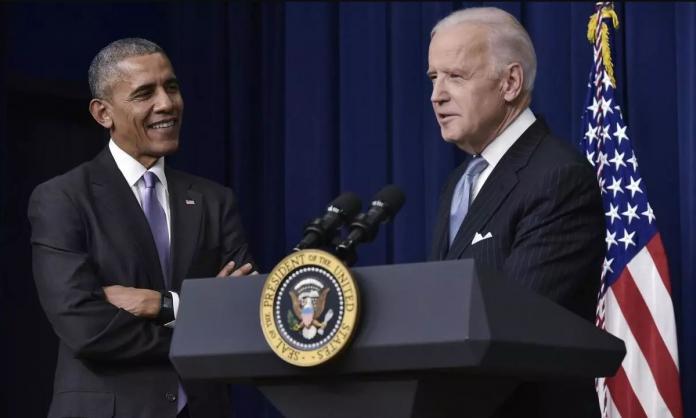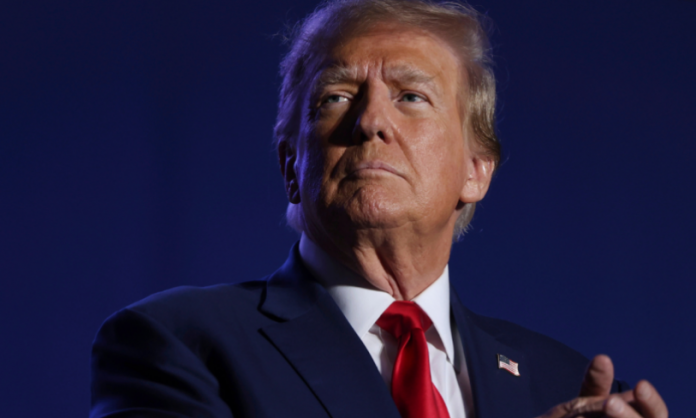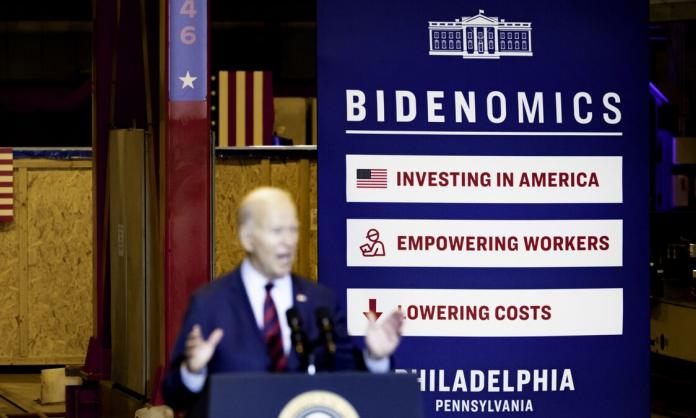Yes, US socialists should vote for Joe Biden: a response to Omar Hassan
Omar Hassan’s criticism of my article calling for a vote for Joe Biden in the US presidential election seems to be a mixture of minimising the dangers of Trump, exaggerating the (awful) record of the Democrats, and basic errors in logic.
Hassan writes: “Much is made of the stacking of the courts with conservatives, a shift that will undoubtedly have a long-term impact on US society. This is nothing new. Republican legislatures in a number of states have been doing that for decades, undermining the rights of workers, women, LGBTI and others in the process”.
But surely Hassan is aware of the significance of Trump’s packing of the Supreme Court and federal courts with far-right ideologues. The federal courts trump (as it were) lower courts, and it is those courts that adjudicate campaign finance rules, and allow or prohibit the voter disenfranchisement, the gerrymandering, the infringements of the rights of workers, women, LGBT folk and others that may occur on the state level. In red states, right-wing judges ratify what the right-wing legislatures want. But Trump-appointed judges in the federal courts will block the country, even with a liberal majority in Congress, from pursuing a progressive agenda.
Hassan acknowledges that “Trump is trying his best to steal the election using all means at his disposal”. But he tells us that “this is hardly a new development in US politics”. Actually, there is much that is new here. No previous president in modern memory has challenged the integrity of the electoral system, has tried to sabotage the postal system, has called for his armed supporters to check for voter fraud, has called on his attorney general to indict his opponents, has tried to add a Supreme Court justice to rule on the election after voting has already begun, and whose allies (like the governor of Texas) have tried to restrict ballot drop boxes to one per county or (like the legislature of Florida) has so blatantly tried to undermine a referendum result that re-enfranchised thousands of voters or (like the legislature in Pennsylvania) seems to be preparing in advance to offer its own set of electors after the election.
Hassan doesn’t have to tell us that Democrats are awful. But it is not the case that Obama “was responsible for the largest build-up of nuclear weapons in decades”. The US nuclear arsenal shrank by 24 percent under Obama.
In response to my argument that Democrats have been more responsive to social movement pressure, Hassan states that one “could point to Obama’s violent repression of climate and Indigenous activists trying to stop the construction of the Dakota Access Pipeline”. Yes, Obama allowed the repression of protesters, but in the final days of his presidency he blocked the pipeline, which was then given the green light by Trump, along with the Keystone pipeline, which had also been blocked by Obama. As I argued, left to their own devices, Democrats don’t do much. But they are more subject to pressure than Trump.
Hassan replies to my warning that Trump is bringing us to the brink of irreversible climate catastrophe by noting that Biden’s environmental plan is inadequate to the crisis we face. That’s true, but irrelevant. Trump, unlike Biden, has been pursuing a program of expanding carbon use and eliminating environmental regulations. Does Hassan agree with the claim by environmentalists that we are fast approaching a tipping point? If he does, then isn’t it important to give ourselves a chance to delay the tipping point as much as possible? Of course, eco-socialism is urgently needed. But it’s not going to happen in the next month. Wishing it were so, won’t make it happen. Adding to the tiny ballot totals for the Green Party won’t make it happen. But voting for Green Party presidential candidate Howie Hawkins rather than Biden in a swing state could give us Trump and disaster. Nothing Hassan has said takes away from this truism.
–Stephen R. Shalom
A response to Omar Hassan on not voting for Joe Biden
Omar Hassan, at the end of his attack on me for suggesting that people in the United States should vote for Joe Biden in the coming presidential election, writes:
“Marxists have a different approach to fighting the nihilistic bigotry of fascism and the far right. At its core, this requires mass movements that can popularise an alternative political ethic based on working-class solidarity and anti-racism, and achieve radical transformation of society in the process.”
I absolutely agree with that. The problem is that in the United States—despite the tremendous anti-racist movements of the spring and summer—we have no mass movement at present. And the US labour movement has little history of economic class struggle in the last forty years and virtually no history of political struggle ever. US unions do not engage in political strikes. So the mass movement that both Hassan and I want is not going to happen today or tomorrow and cannot stop Trump.
Oddly, for a Marxist, Hassan follows that intelligent sentence with this one in his conclusion: “That starts by refusing to accept that politics is a choice between two sides of a fundamentally reactionary ruling class”.
Mass movements, however, do not begin by people choosing sides between classes or ideologies. They usually begin with some incident large or small (like the murder of George Floyd) that sets in motion some local group, which, if it has the good fortune to succeed, in turn sets masses of people in motion. Such a movement can lead to a radicalising political consciousness and a willingness to take a political stand. But some small number of leftists deciding not to vote for Biden or to vote for Howie Hawkins of the Green Party or to vote for no-one will have no impact whatsoever on building a mass movement.
There is an unstated premise behind Hassan’s attack on my article encouraging voting for Biden, which is that both parties are fundamentally the same. I am glad that Hassan is so confident that fascism isn’t on the agenda in the United States, and I think he’s probably right. But Trump has been imposing an authoritarian regime that is far different and far more dangerous than the previous Bush, Clinton and Obama administrations. If Trump wins four more years it will be far worse for Blacks, Latinx, immigrants, labour unions and workers than those governments or a future neoliberal Biden government. It will be worse for dealing with climate change. Most important, it could end America’s very flawed democracy, which is, nevertheless, worth defending.
So, since we don’t have a mass movement prepared to stop Trump, I urged people to vote for Biden. Since Hassan didn’t explain or really speak to my arguments, I think I should restate my position:
“The Democratic Party remains a capitalist and imperialist party. I do not believe that reformers can have much impact on its general policies and direction, and I certainly do not believe that it can be taken over by the left. Joseph Biden is a repugnant candidate, as Branko Marcetic detailed in his book Yesterday’s Man. He helped the Democratic Party to carry out the neoliberal turn from the working class to the professional classes, and he supported the racist and imperial policies of the Clinton and Obama presidencies. I am not a political supporter of either the Democratic Party nor of its candidate Joe Biden, but I urge a vote for him on narrow and pragmatic grounds: to prevent Trump from having a second term.
“I have come to the conclusion that this election—with the possibility of massive electoral fraud, the likely refusal of Trump, should he lose, to leave the White House, and a possible coup d’état—is quite different from anything in my life time or in American history. All the major media institutions, TV, press, and social media, are discussing the possibility of a right-wing seizure of power by Trump. I am not urging a vote for the Democratic Party because it necessarily can or will stop a coup.
“I do NOT believe that the Democratic Party is a bulwark against an authoritarian or fascist coup. But I do believe that a large vote for Biden everywhere, even in safe states where one might vote for the Green Party, makes it more difficult for Trump to justify to the Republican Party, to his base, and to the American people that he has the right to stay in office. I do not wish to make it easier for Trump to move ahead by claiming he won the election if he did not. Voting for Biden certainly does not represent in any way on my part a commitment to the Democratic Party or its candidates in the future. But this time I will vote for Biden.”
Of course, we should continue to build the movement that Hassan and I want. And if Hassan it going to debate people’s ideas, he should take on what they really said.
–Dan La Botz
Socialists and Biden: response from Omar Hassan
I appreciate the time taken by Dan La Botz and Stephen Shalom to respond to my piece “Socialists should not vote for Joe Biden”, as I think this is an important issue to grapple with. In my opinion, their responses highlight three key points of difference between their position and my own.
The first two are the most straightforward, involving an analysis of the strength of President Trump and the far right, and whether a vote for Biden will help defend workers, immigrants, people of colour and the poor from the multiple crises of US capitalism. The third was not a major focus of either my original piece or of La Botz and Shalom’s replies, but is the most important of all. It concerns the question of how the small forces of the revolutionary left can best promote political independence from the parties of big business, both in unions, broader social movements and as part of building larger and more coherent revolutionary organisations.
It is uncontested that Trump is a despicable human being, who has amplified the arguments and legitimised the organisations of the far right. Nor does anyone doubt that his Supreme Court nominations will seek to undermine the rights of workers and the oppressed for years to come.
But both Shalom and La Botz argue that Trump represents a fundamentally “new” or “different” threat to democracy and the oppressed compared to what has come before. As part of a list of Trump’s anti-democratic manoeuvres, Shalom insists that “No previous president in modern memory has challenged the integrity of the electoral system”, and La Botz implies that democracy in the US is in grave peril, despite previously admitting that fascism is not a likely outcome of the next election.
Even if Trump was a fascist, since when has the left argued that voting for a bourgeois politician was an effective strategy to stop fascism? In France, the vast majority of revolutionaries held their nerve and refused to call for a vote for Emmanuel Macron in 2017, even as they mobilised hard against the threat of his opponent, National Front leader Marine Le Pen, a politician backed by a movement with far more claim to be fascist than anything Trump could dream of. This approach reflected the wisdom generated by decades of theorising and practical experience: lining up behind conservative or centrist bourgeois politicians against the far right is a losing strategy, because it cannot prepare left wing workers for the necessary battle, it is incompatible with mass mobilisation and confrontation of the far right that is key to their defeat, and it cannot offer solutions to the social crises that allow fascism to grow.
But as I previously argued, the argument that a Trump victory will lead to fascism or even a qualitative break from democratic norms doesn’t stand up to scrutiny. The suppression of Black and working-class votes via harassment, legal chicanery and arcane bureaucracy is a tradition as old as the US itself. The fact that election is scheduled on a week day makes it difficult for workers and people of colour to participate, and absurd gerrymandering means their votes often do not count. Aggressive poll monitoring—aka scaring away poor and racially diverse voters—is also a well-documented tactic. As well, people might remember the entire Jim Crow era, in which black people were lynched for even thinking about voting.
And if we want to imagine what a stolen election might look like, we need only think back to George W Bush’s “victory” in 2000. Bush was awarded Florida by a mere 500 votes, after the Republicans organised a riot by wealthy lawyers to prevent crucial recounts in urban polling stations. A subsequent report found black voters in that state were “10 times more likely than white voters to have their ballots rejected”, often on the basis of technicalities. Oh, and his brother was governor at the time. Thus we see that the precise scenario that La Botz raises, of a close election determined by an unelected Supreme Court has already been tested. The Democratic capitulation to Bush makes clear that they are more concerned to protect the stability and legitimacy of reactionary institutions like the Supreme Court, than they are with protecting the democratic rights of the mass of people.
So yes, the left should be fighting to defend and radically extend democracy in the US, and should happily work with anyone who is sincerely committed to that battle. But despite the fact that the spectre of “fascism” has been raised in every other election since the 1930s, the Democrats have never taken any real steps to redress the many democratic deficits that plague the US system, including gerrymandering, the electoral college, the supreme court, and the US senate. Now they are seeking to ban the Greens from even appearing on the ballot. So the battle for democracy in the US is a battle against both major parties.
Which brings us to the second point of contention, regarding the nature of the Democratic Party. La Botz agrees that the Democrats are an imperialist and neoliberal party offering nothing for workers. Yet in quoting his earlier piece he reiterates that they are a lesser evil in comparison to the dangerous Trump, and should therefore be supported. This position is contrasted with a caricature of my own, which is that the Democrats and the Republicans are “fundamentally the same”. In fact, as I explained in my original piece, the parties have different social bases, which leads to subtle but important differences in their organisational structure, mobilising strategies and political ideologies. The outcome is furious debate between two parties that look and sound distinct, creating the illusion of democratic choice in a system ruled by the rich.
Having said that, La Botz is right to suggest that my position rests on the premise that the two parties have something fundamentally in common. Both parties are funded and controlled by big business, and their main priority is to serve their interests and those of the US imperial state. This analysis is not some innovation of mine, it is the standing position of the socialist movement in the US going back to Eugene Debs and the early Socialist Party.
An analogy may help to explain why this is the case. For socialists, the most basic step in working-class consciousness is to see that the interests of workers and bosses are counterposed. This is not to say that all bosses are exactly the same. Some are mean-spirited and cheap while others are relatively generous. But no worker is ever served by seeing their boss as their ally, and class collaborationism is anathema to decent trade unionism. Yet voting for the Democrats is just a different version of class collaboration. It necessarily means providing support for a party owned and controlled by bosses, albeit one with the best diversity training money can buy.
While it’s unclear whether La Botz has fully abandoned this position, in practice his argument is a capitulation to the liberalism that dominates the US left. His slide from endorsing Sanders in 2016 to promoting Biden in 2020 is a reminder of the importance of maintaining the principle of class independence.
Shalom’s piece is both more consistent and more conservative. He reaffirms his earlier view that Democratic candidates are worthy of support over Republicans across the board. As I predicted, this position leads him to downplay the party’s many crimes against humanity. In his short piece he manages to defend the indefensible on three counts.
First, Obama’s abysmal record on nuclear weapons, including his decision to invest a record-breaking $1 trillion into new warheads. Second, Shalom presents Obama’s criminal negligence on the environment as a victory, based on a few token gestures towards the end of his term. By the same logic, we should celebrate his belated release of heroic whistle-blower Chelsea Manning from prison, after leaving her to rot for seven years! Finally, Shalom chose not to engage with the fact that it is overwhelmingly Democratic cops in Democratic cities that are responsible for the mass murder of Black people. Is this the kind of responsiveness to social movements that we can look forward to under a Biden administration?
In dismissing such facts about the Democrats as “irrelevant”, Shalom clarifies that in his view the task of the socialist left during elections is harm minimisation. This view reflects the historic weakness of a US left that has never been able to construct an independent working-class party, a basic political task achieved in every other Western country more than a century ago.
In contrast to this liberal approach, Marx and Engels outlined a socialist attitude to elections that continues to be relevant today. In their address to the Communist League in 1850, they argued “even when there is no prospect of them being elected, the workers must put up their own candidates in order to preserve their independence, to count their forces, and to bring before the public their revolutionary attitude and party standpoint. In this connection they must not allow themselves to be seduced by such arguments of the democrats as, for example, that by so doing they are splitting the democratic party and making it possible for the reactionaries to win. The ultimate intention of all such phrases is to dupe the proletariat. The advance which the proletarian party is bound to make by such independent action is infinitely more important than the disadvantage that might be incurred by the presence of a few reactionaries in the representative body”.
Marx and Engels here take for granted a sizable radical left that does not exist in most countries today, a fact which means it would be silly to run in every election on principle. But the core of their argument is nevertheless correct. We should measure the success of a socialist intervention into a bourgeois election not simply by its vote tally, still less the policies which emerge as a result, but by whether it builds the independent fighting capacity of workers and the left. Accepting the permanent enslavement of the latter to the Democratic party does nothing to help this project along.
Which raises the final issue I would like to address, regarding the challenges of the left in the US and across the world. We live in barbaric times. Over a million people have been killed by a virus that could have been controlled by rational planning, the prospect of imperial wars are growing daily, an ongoing crisis in the world global economy is driving millions into poverty, and the planet is hurtling towards destruction.
Faced with these compounding calamities, millions are looking for alternatives. The socialist left now has an opportunity to be making revolutionary arguments about the way forward that connect with the militant instincts of a small but significant minority of public opinion, especially among youth. Given this situation, and the substantial shift to the right within the Democratic Socialists of America leadership, there is a clear space for a principled revolutionary organisation to begin to grow, capable of both propagandising for socialism and organising to fight for reforms today.
La Botz conflated my argument regarding political independence in the socialist left as an argument to be brought into the campaigns the left is involved with. He is right to say that masses of workers, students and the oppressed will attend protests and join the broader left without clarity on the question of the Democratic party, just as they do not enter the struggle with an understanding of the need for revolution, or even the central role of the working class. It would be wrong to insist on a clear understanding of all these issues as a precondition for joint work.
But the socialist attitude to mass radicalisation has never been to simply agree with the prevailing sentiments that exist at any moment. So while we try to organise the widest and most militant mass movements possible around issues of importance, we simultaneously insist on fighting for socialist politics within the broader movement.
The approach argued for by La Botz and Shalom, and shared by many who call themselves socialists in America, would not assist this process in any way. In fact, their arguments threaten to curtail the growing disillusionment with establishment Democrats by actively encouraging a new generation of young socialists to throw their lot in with arguably the most powerful capitalist party on earth. And if Biden wins, which seems increasingly likely, the Democrats will begin planning the fear campaign to get out the vote in the midterms. Will the US left join them in seeing the threat of fascism in every congressional seat up for grabs, or will it be ready to fight Biden from day one?
–Omar Hassan











